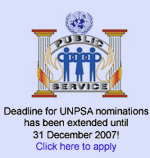 |
The Committee of Experts on Public Administration, comprised of 24 members who meet annually at UN Headquarters, is responsible for supporting the work of ECOSOC concerning the promotion and development of public administration and governance among Member States, in connection with the UN Millennium Development Goals.
|
 |
The UN General Assembly has designated June 23rd as UN Public Service Day to “celebrate the value and virtue of service to the community”. On this day, the UN Public Service Awards are presented by DPADM for contributions made towards enhancing the role and visibility of public service.
|
 |
The United Nations Public Administration Network is a one-window access to worldwide, multi-lingual resources on public administration and public sector policy. UNPAN is the only such public administration web-portal in the world today. http://www.unpan.org |
 |
The UN E-Government Survey assesses the e-government readiness of the 193 Member States of the UN according to a quantitative composite index of e-readiness based on website assessment, telecommunication infrastructure, and human resource endowment. ICTs can help reinvent government in such a way that existing institutional arrangements can be restructured and new innovative arrangements can flourish, paving the way for a transformed government.
|
 |
The UNPAN Online Training Centre delivers courses on various topics in public administration. The main objective of the UNPAN Training Centre is to increase the opportunities for government officials from all over the world to access training materials on e-government. UNPAN online training courses are available to anyone with Internet access and are provided free of charge. UNPAN on-line training courses are available in English, French, Ukrainian, Russian and Arabic.
|
 |
The United Nations Public Administration Country Studies (UNPACS) is a comprehensive, up-to-date and readily-accessible knowledge-base with the Members States as its direct target users, with three thematic areas identical to DPADM/DESA’s work areas, which are: (a) Electronic/mobile government development; (b) Institutional and human resource capacity development; (c) citizen engagement and ICTs for development management and the Millennium Development Goals (MDGs). |